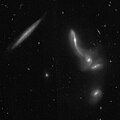Astronomy:NGC 3718
| NGC 3718 | |
|---|---|
 NGC 3718 (left) with its companion, NGC 3729 | |
| Observation data (J2000.0 epoch) | |
| Constellation | Ursa Major |
| Right ascension | 11h 32m 34.940s[1] |
| Declination | +53° 04′ 04.18″[1] |
| Redshift | 0.003306[2] |
| Distance | 47.84 ± 8.54 Mly (14.667 ± 2.618 Mpc)[3] |
| Apparent magnitude (V) | 10.61[2] |
| Characteristics | |
| Type | SB(s)a pec[3] |
| Apparent size (V) | 2.940′ × 2.352′[1] |
| Other designations | |
| Arp 214, UGC 6524, MCG+09-19-114, PGC 35616[2] | |
Coordinates: ![]() 11h 32m 34.9s, +53° 04′ 04″
NGC 3718, also called Arp 214, is a galaxy located approximately 52 million light years from Earth in the constellation Ursa Major. Near NGC 3718 is the galaxy NGC 3729, a peculiar barred spiral galaxy.[4][2][5] It is either a lenticular or spiral galaxy.[6]
11h 32m 34.9s, +53° 04′ 04″
NGC 3718, also called Arp 214, is a galaxy located approximately 52 million light years from Earth in the constellation Ursa Major. Near NGC 3718 is the galaxy NGC 3729, a peculiar barred spiral galaxy.[4][2][5] It is either a lenticular or spiral galaxy.[6]
NGC 3718 exhibits a warped, S-shape similar to NGC 6872, possibly a result of gravitational interaction with NGC 3729, another spiral galaxy located 150,000 light-years away. The Hickson Compact Group 56 can be seen south of one of NGC 3718's spiral arms. HCG 56 is eight times farther away than NGC 3718 and NGC 3729.[7]
NGC 3718 is a member of the Ursa Major Cluster.[8]
Hickson Compact Group
South of NGC 3718 the Hickson Compact Group #56 is located. HCG 56 is a compact group of galaxies of which 4 members are interacting with each other. This group is about 120 Mpc distant to our galaxy,[9] which is about 8 times more distant than NGC 3718.
Gallery
-
NGC 3718 and its companion NGC 3729.
-
NGC 3718 and HCG 56 with the legacy surveys
-
The Hickson Compact Group #56 with Hubble
References
- ↑ 1.0 1.1 1.2 Skrutskie, Michael F.; Cutri, Roc M.; Stiening, Rae; Weinberg, Martin D.; Schneider, Stephen E.; Carpenter, John M.; Beichman, Charles A.; Capps, Richard W. et al. (1 February 2006). "The Two Micron All Sky Survey (2MASS)". The Astronomical Journal 131 (2): 1163–1183. doi:10.1086/498708. ISSN 0004-6256. Bibcode: 2006AJ....131.1163S.
- ↑ 2.0 2.1 2.2 2.3 "NGC 3718". SIMBAD. Centre de données astronomiques de Strasbourg. http://simbad.u-strasbg.fr/simbad/sim-basic?Ident=NGC+3718.
- ↑ 3.0 3.1 "NED results for object NGC 3718". National Aeronautics and Space Administration / Infrared Processing and Analysis Center. http://nedwww.ipac.caltech.edu/cgi-bin/nph-objsearch?objname=NGC+3718&extend=no&out_csys=Equatorial&out_equinox=J2000.0&obj_sort=RA+or+Longitude&of=pre_text&zv_breaker=30000.0&list_limit=5&img_stamp=YES.
- ↑ Nemiroff, R.; Bonnell, J., eds (31 August 2006). "Extra Galaxies". Astronomy Picture of the Day. NASA. https://apod.nasa.gov/apod/ap060831.html.
- ↑ "Best of AOP: NGC 3718". noao.edu. http://www.noao.edu/outreach/aop/observers/n3718.html.
- ↑ "NGC 3718, Spiral Galaxy". kopernik.org. http://www.kopernik.org/images/archive/n3718.htm.
- ↑ "APOD: 2013 August 3 - Twisting with NGC 3718". http://apod.nasa.gov/apod/ap130803.html.
- ↑ Tully, R. Brent; Verheijen, Marc A. W.; Pierce, Michael J.; Huang, Jia-Sheng; Wainscoat, Richard J. (December 1996). "The Ursa Major Cluster of Galaxies.I.Cluster Definition and Photometric Data". The Astronomical Journal 112: 2471. doi:10.1086/118196. ISSN 0004-6256. Bibcode: 1996AJ....112.2471T.
- ↑ "By Name | NASA/IPAC Extragalactic Database". https://ned.ipac.caltech.edu/byname?objname=HCG+56&hconst=67.8&omegam=0.308&omegav=0.692&wmap=4&corr_z=1.
External links
Template:NGC objects:3001-4000
 |



